Research Report: Hilton's Response and Recovery Strategy Post-COVID
VerifiedAdded on 2023/06/12
|25
|6690
|178
Report
AI Summary
This research report evaluates Hilton's response and recovery strategies for managing the decline in foreign tourist numbers post-COVID-19. It utilizes both literature review and primary research, including a survey of 30 Hilton marketing employees, to assess the effectiveness of strategies like enhanced hygiene and safety measures. Qualitative analysis of the survey data reveals that these strategies have positively impacted operational efficiency and profitability. The report also provides recommendations for further enhancing Hilton's ability to attract foreign tourists and sustain growth in the post-pandemic environment.
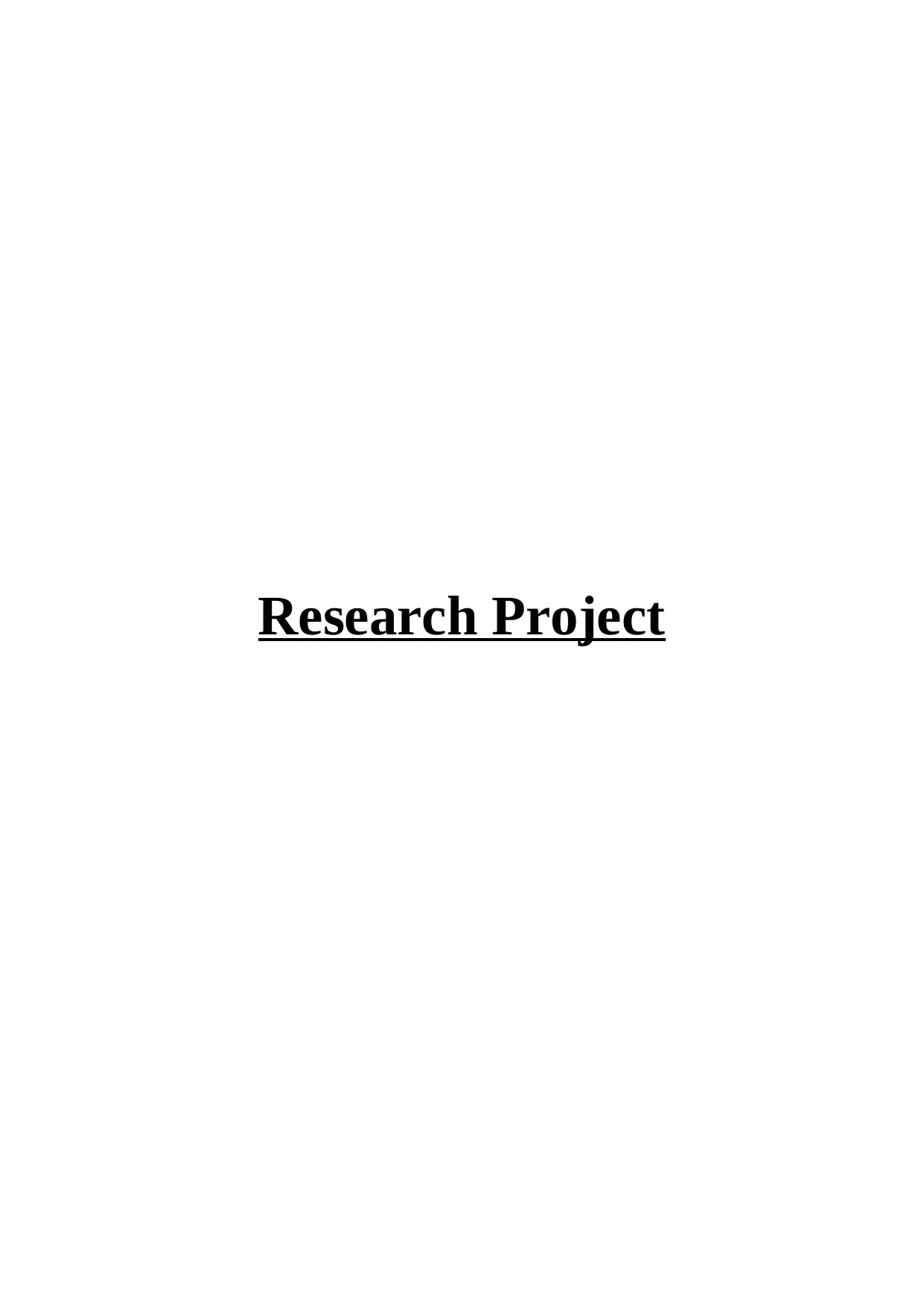
Research Project
Paraphrase This Document
Need a fresh take? Get an instant paraphrase of this document with our AI Paraphraser
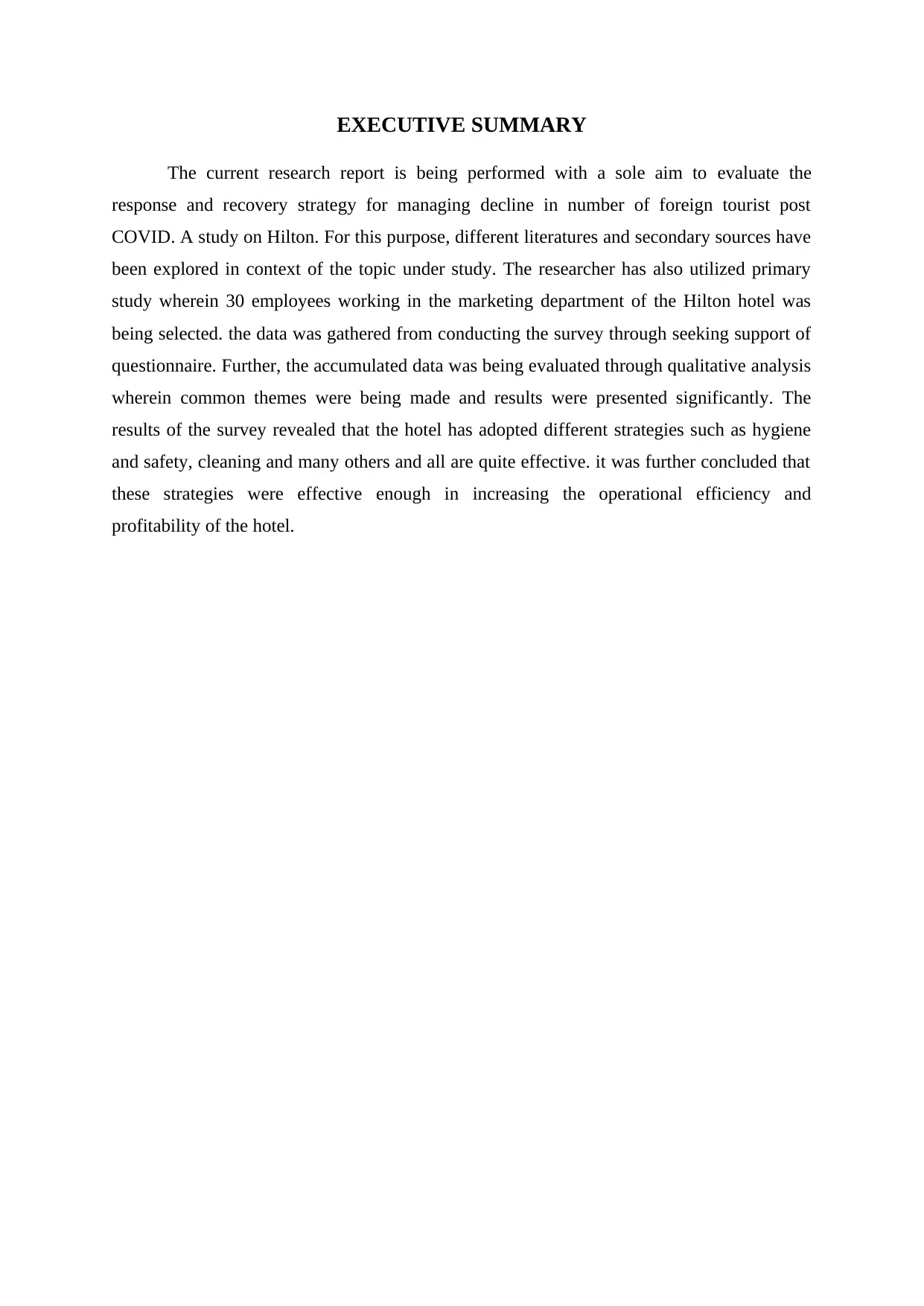
EXECUTIVE SUMMARY
The current research report is being performed with a sole aim to evaluate the
response and recovery strategy for managing decline in number of foreign tourist post
COVID. A study on Hilton. For this purpose, different literatures and secondary sources have
been explored in context of the topic under study. The researcher has also utilized primary
study wherein 30 employees working in the marketing department of the Hilton hotel was
being selected. the data was gathered from conducting the survey through seeking support of
questionnaire. Further, the accumulated data was being evaluated through qualitative analysis
wherein common themes were being made and results were presented significantly. The
results of the survey revealed that the hotel has adopted different strategies such as hygiene
and safety, cleaning and many others and all are quite effective. it was further concluded that
these strategies were effective enough in increasing the operational efficiency and
profitability of the hotel.
The current research report is being performed with a sole aim to evaluate the
response and recovery strategy for managing decline in number of foreign tourist post
COVID. A study on Hilton. For this purpose, different literatures and secondary sources have
been explored in context of the topic under study. The researcher has also utilized primary
study wherein 30 employees working in the marketing department of the Hilton hotel was
being selected. the data was gathered from conducting the survey through seeking support of
questionnaire. Further, the accumulated data was being evaluated through qualitative analysis
wherein common themes were being made and results were presented significantly. The
results of the survey revealed that the hotel has adopted different strategies such as hygiene
and safety, cleaning and many others and all are quite effective. it was further concluded that
these strategies were effective enough in increasing the operational efficiency and
profitability of the hotel.
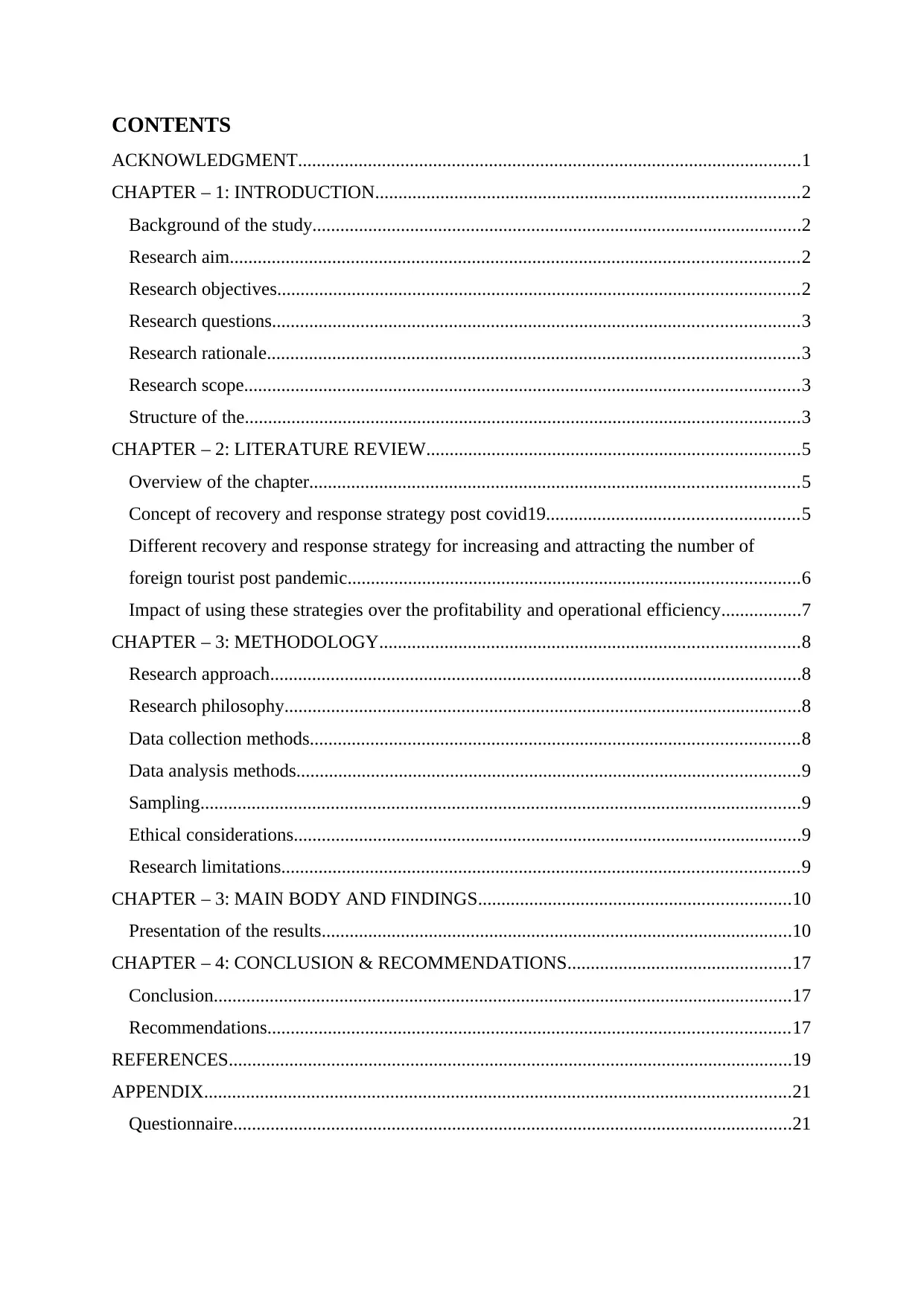
CONTENTS
ACKNOWLEDGMENT............................................................................................................1
CHAPTER – 1: INTRODUCTION...........................................................................................2
Background of the study.........................................................................................................2
Research aim..........................................................................................................................2
Research objectives................................................................................................................2
Research questions.................................................................................................................3
Research rationale..................................................................................................................3
Research scope.......................................................................................................................3
Structure of the.......................................................................................................................3
CHAPTER – 2: LITERATURE REVIEW................................................................................5
Overview of the chapter.........................................................................................................5
Concept of recovery and response strategy post covid19......................................................5
Different recovery and response strategy for increasing and attracting the number of
foreign tourist post pandemic.................................................................................................6
Impact of using these strategies over the profitability and operational efficiency.................7
CHAPTER – 3: METHODOLOGY..........................................................................................8
Research approach..................................................................................................................8
Research philosophy...............................................................................................................8
Data collection methods.........................................................................................................8
Data analysis methods............................................................................................................9
Sampling.................................................................................................................................9
Ethical considerations.............................................................................................................9
Research limitations...............................................................................................................9
CHAPTER – 3: MAIN BODY AND FINDINGS...................................................................10
Presentation of the results.....................................................................................................10
CHAPTER – 4: CONCLUSION & RECOMMENDATIONS................................................17
Conclusion............................................................................................................................17
Recommendations................................................................................................................17
REFERENCES.........................................................................................................................19
APPENDIX..............................................................................................................................21
Questionnaire........................................................................................................................21
ACKNOWLEDGMENT............................................................................................................1
CHAPTER – 1: INTRODUCTION...........................................................................................2
Background of the study.........................................................................................................2
Research aim..........................................................................................................................2
Research objectives................................................................................................................2
Research questions.................................................................................................................3
Research rationale..................................................................................................................3
Research scope.......................................................................................................................3
Structure of the.......................................................................................................................3
CHAPTER – 2: LITERATURE REVIEW................................................................................5
Overview of the chapter.........................................................................................................5
Concept of recovery and response strategy post covid19......................................................5
Different recovery and response strategy for increasing and attracting the number of
foreign tourist post pandemic.................................................................................................6
Impact of using these strategies over the profitability and operational efficiency.................7
CHAPTER – 3: METHODOLOGY..........................................................................................8
Research approach..................................................................................................................8
Research philosophy...............................................................................................................8
Data collection methods.........................................................................................................8
Data analysis methods............................................................................................................9
Sampling.................................................................................................................................9
Ethical considerations.............................................................................................................9
Research limitations...............................................................................................................9
CHAPTER – 3: MAIN BODY AND FINDINGS...................................................................10
Presentation of the results.....................................................................................................10
CHAPTER – 4: CONCLUSION & RECOMMENDATIONS................................................17
Conclusion............................................................................................................................17
Recommendations................................................................................................................17
REFERENCES.........................................................................................................................19
APPENDIX..............................................................................................................................21
Questionnaire........................................................................................................................21
⊘ This is a preview!⊘
Do you want full access?
Subscribe today to unlock all pages.

Trusted by 1+ million students worldwide
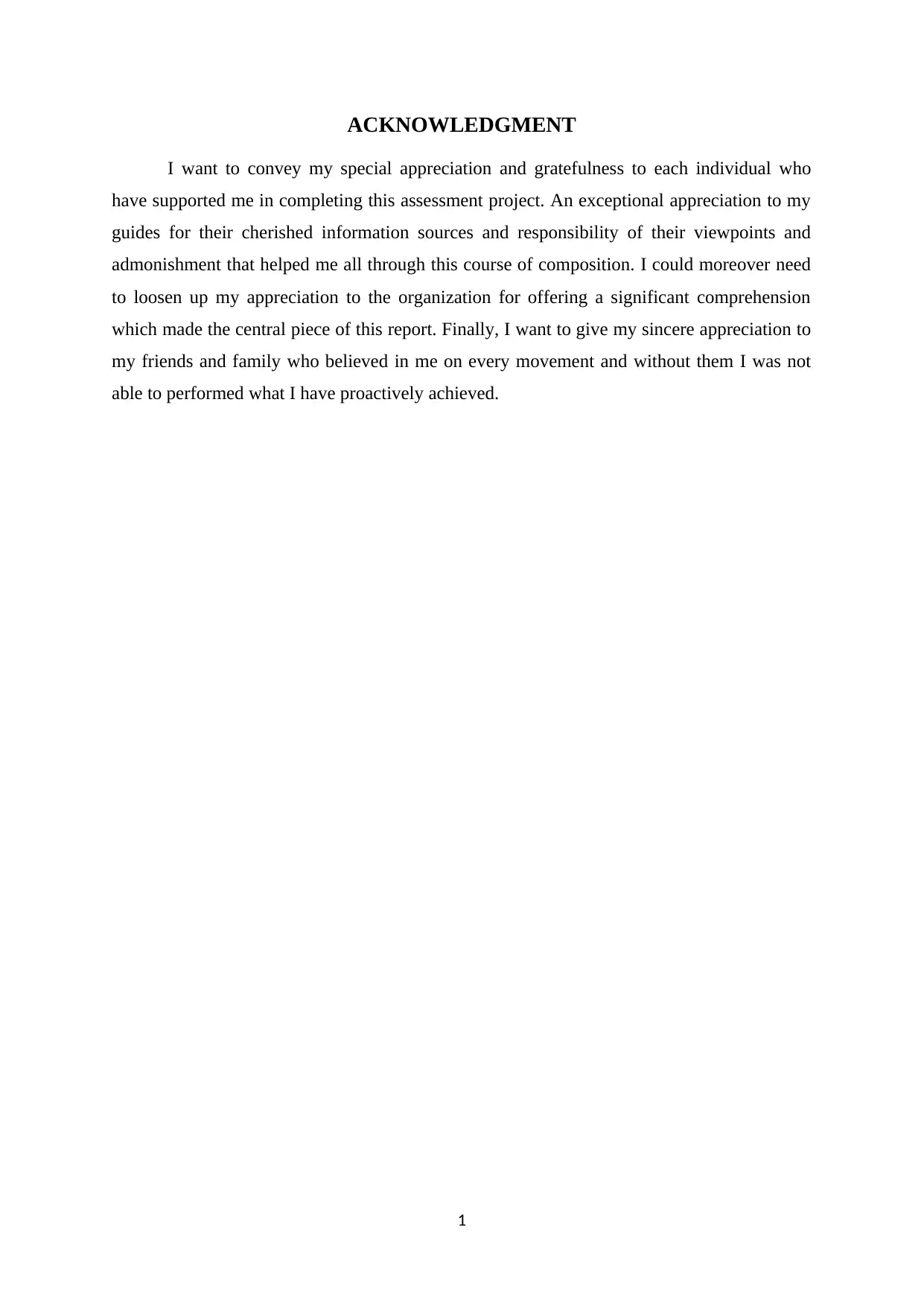
ACKNOWLEDGMENT
I want to convey my special appreciation and gratefulness to each individual who
have supported me in completing this assessment project. An exceptional appreciation to my
guides for their cherished information sources and responsibility of their viewpoints and
admonishment that helped me all through this course of composition. I could moreover need
to loosen up my appreciation to the organization for offering a significant comprehension
which made the central piece of this report. Finally, I want to give my sincere appreciation to
my friends and family who believed in me on every movement and without them I was not
able to performed what I have proactively achieved.
1
I want to convey my special appreciation and gratefulness to each individual who
have supported me in completing this assessment project. An exceptional appreciation to my
guides for their cherished information sources and responsibility of their viewpoints and
admonishment that helped me all through this course of composition. I could moreover need
to loosen up my appreciation to the organization for offering a significant comprehension
which made the central piece of this report. Finally, I want to give my sincere appreciation to
my friends and family who believed in me on every movement and without them I was not
able to performed what I have proactively achieved.
1
Paraphrase This Document
Need a fresh take? Get an instant paraphrase of this document with our AI Paraphraser
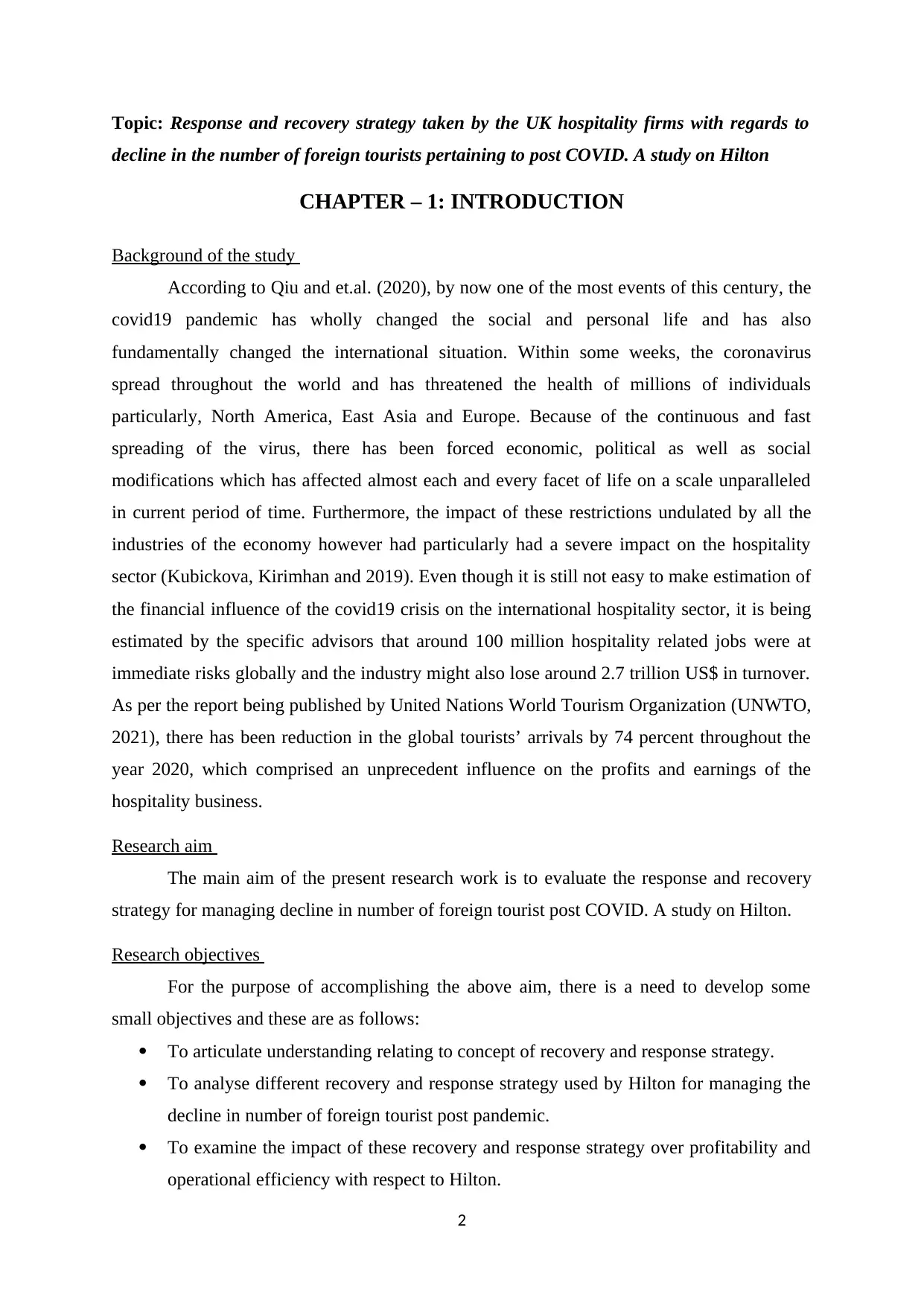
Topic: Response and recovery strategy taken by the UK hospitality firms with regards to
decline in the number of foreign tourists pertaining to post COVID. A study on Hilton
CHAPTER – 1: INTRODUCTION
Background of the study
According to Qiu and et.al. (2020), by now one of the most events of this century, the
covid19 pandemic has wholly changed the social and personal life and has also
fundamentally changed the international situation. Within some weeks, the coronavirus
spread throughout the world and has threatened the health of millions of individuals
particularly, North America, East Asia and Europe. Because of the continuous and fast
spreading of the virus, there has been forced economic, political as well as social
modifications which has affected almost each and every facet of life on a scale unparalleled
in current period of time. Furthermore, the impact of these restrictions undulated by all the
industries of the economy however had particularly had a severe impact on the hospitality
sector (Kubickova, Kirimhan and 2019). Even though it is still not easy to make estimation of
the financial influence of the covid19 crisis on the international hospitality sector, it is being
estimated by the specific advisors that around 100 million hospitality related jobs were at
immediate risks globally and the industry might also lose around 2.7 trillion US$ in turnover.
As per the report being published by United Nations World Tourism Organization (UNWTO,
2021), there has been reduction in the global tourists’ arrivals by 74 percent throughout the
year 2020, which comprised an unprecedent influence on the profits and earnings of the
hospitality business.
Research aim
The main aim of the present research work is to evaluate the response and recovery
strategy for managing decline in number of foreign tourist post COVID. A study on Hilton.
Research objectives
For the purpose of accomplishing the above aim, there is a need to develop some
small objectives and these are as follows:
To articulate understanding relating to concept of recovery and response strategy.
To analyse different recovery and response strategy used by Hilton for managing the
decline in number of foreign tourist post pandemic.
To examine the impact of these recovery and response strategy over profitability and
operational efficiency with respect to Hilton.
2
decline in the number of foreign tourists pertaining to post COVID. A study on Hilton
CHAPTER – 1: INTRODUCTION
Background of the study
According to Qiu and et.al. (2020), by now one of the most events of this century, the
covid19 pandemic has wholly changed the social and personal life and has also
fundamentally changed the international situation. Within some weeks, the coronavirus
spread throughout the world and has threatened the health of millions of individuals
particularly, North America, East Asia and Europe. Because of the continuous and fast
spreading of the virus, there has been forced economic, political as well as social
modifications which has affected almost each and every facet of life on a scale unparalleled
in current period of time. Furthermore, the impact of these restrictions undulated by all the
industries of the economy however had particularly had a severe impact on the hospitality
sector (Kubickova, Kirimhan and 2019). Even though it is still not easy to make estimation of
the financial influence of the covid19 crisis on the international hospitality sector, it is being
estimated by the specific advisors that around 100 million hospitality related jobs were at
immediate risks globally and the industry might also lose around 2.7 trillion US$ in turnover.
As per the report being published by United Nations World Tourism Organization (UNWTO,
2021), there has been reduction in the global tourists’ arrivals by 74 percent throughout the
year 2020, which comprised an unprecedent influence on the profits and earnings of the
hospitality business.
Research aim
The main aim of the present research work is to evaluate the response and recovery
strategy for managing decline in number of foreign tourist post COVID. A study on Hilton.
Research objectives
For the purpose of accomplishing the above aim, there is a need to develop some
small objectives and these are as follows:
To articulate understanding relating to concept of recovery and response strategy.
To analyse different recovery and response strategy used by Hilton for managing the
decline in number of foreign tourist post pandemic.
To examine the impact of these recovery and response strategy over profitability and
operational efficiency with respect to Hilton.
2
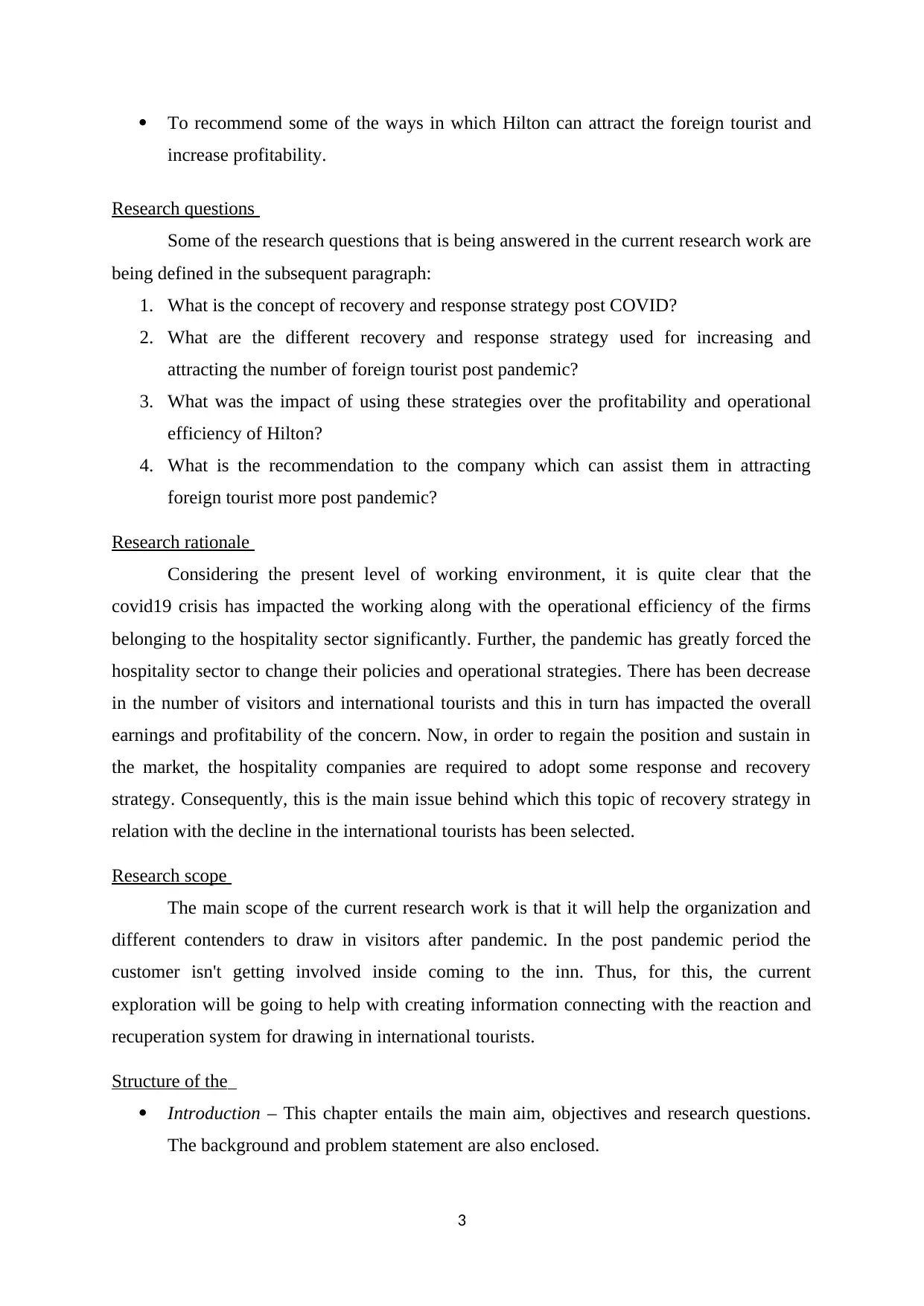
To recommend some of the ways in which Hilton can attract the foreign tourist and
increase profitability.
Research questions
Some of the research questions that is being answered in the current research work are
being defined in the subsequent paragraph:
1. What is the concept of recovery and response strategy post COVID?
2. What are the different recovery and response strategy used for increasing and
attracting the number of foreign tourist post pandemic?
3. What was the impact of using these strategies over the profitability and operational
efficiency of Hilton?
4. What is the recommendation to the company which can assist them in attracting
foreign tourist more post pandemic?
Research rationale
Considering the present level of working environment, it is quite clear that the
covid19 crisis has impacted the working along with the operational efficiency of the firms
belonging to the hospitality sector significantly. Further, the pandemic has greatly forced the
hospitality sector to change their policies and operational strategies. There has been decrease
in the number of visitors and international tourists and this in turn has impacted the overall
earnings and profitability of the concern. Now, in order to regain the position and sustain in
the market, the hospitality companies are required to adopt some response and recovery
strategy. Consequently, this is the main issue behind which this topic of recovery strategy in
relation with the decline in the international tourists has been selected.
Research scope
The main scope of the current research work is that it will help the organization and
different contenders to draw in visitors after pandemic. In the post pandemic period the
customer isn't getting involved inside coming to the inn. Thus, for this, the current
exploration will be going to help with creating information connecting with the reaction and
recuperation system for drawing in international tourists.
Structure of the
Introduction – This chapter entails the main aim, objectives and research questions.
The background and problem statement are also enclosed.
3
increase profitability.
Research questions
Some of the research questions that is being answered in the current research work are
being defined in the subsequent paragraph:
1. What is the concept of recovery and response strategy post COVID?
2. What are the different recovery and response strategy used for increasing and
attracting the number of foreign tourist post pandemic?
3. What was the impact of using these strategies over the profitability and operational
efficiency of Hilton?
4. What is the recommendation to the company which can assist them in attracting
foreign tourist more post pandemic?
Research rationale
Considering the present level of working environment, it is quite clear that the
covid19 crisis has impacted the working along with the operational efficiency of the firms
belonging to the hospitality sector significantly. Further, the pandemic has greatly forced the
hospitality sector to change their policies and operational strategies. There has been decrease
in the number of visitors and international tourists and this in turn has impacted the overall
earnings and profitability of the concern. Now, in order to regain the position and sustain in
the market, the hospitality companies are required to adopt some response and recovery
strategy. Consequently, this is the main issue behind which this topic of recovery strategy in
relation with the decline in the international tourists has been selected.
Research scope
The main scope of the current research work is that it will help the organization and
different contenders to draw in visitors after pandemic. In the post pandemic period the
customer isn't getting involved inside coming to the inn. Thus, for this, the current
exploration will be going to help with creating information connecting with the reaction and
recuperation system for drawing in international tourists.
Structure of the
Introduction – This chapter entails the main aim, objectives and research questions.
The background and problem statement are also enclosed.
3
⊘ This is a preview!⊘
Do you want full access?
Subscribe today to unlock all pages.

Trusted by 1+ million students worldwide
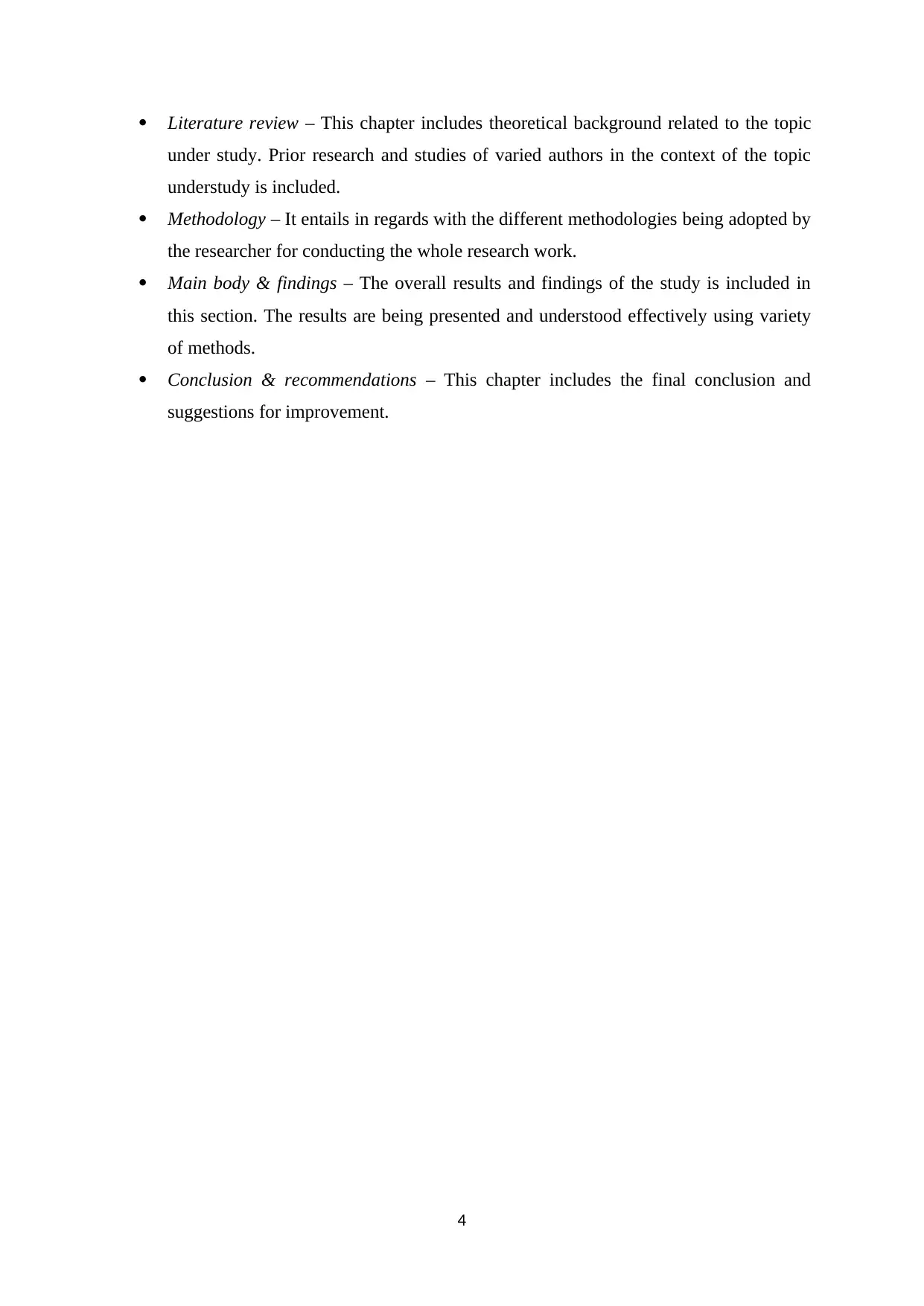
Literature review – This chapter includes theoretical background related to the topic
under study. Prior research and studies of varied authors in the context of the topic
understudy is included.
Methodology – It entails in regards with the different methodologies being adopted by
the researcher for conducting the whole research work.
Main body & findings – The overall results and findings of the study is included in
this section. The results are being presented and understood effectively using variety
of methods.
Conclusion & recommendations – This chapter includes the final conclusion and
suggestions for improvement.
4
under study. Prior research and studies of varied authors in the context of the topic
understudy is included.
Methodology – It entails in regards with the different methodologies being adopted by
the researcher for conducting the whole research work.
Main body & findings – The overall results and findings of the study is included in
this section. The results are being presented and understood effectively using variety
of methods.
Conclusion & recommendations – This chapter includes the final conclusion and
suggestions for improvement.
4
Paraphrase This Document
Need a fresh take? Get an instant paraphrase of this document with our AI Paraphraser
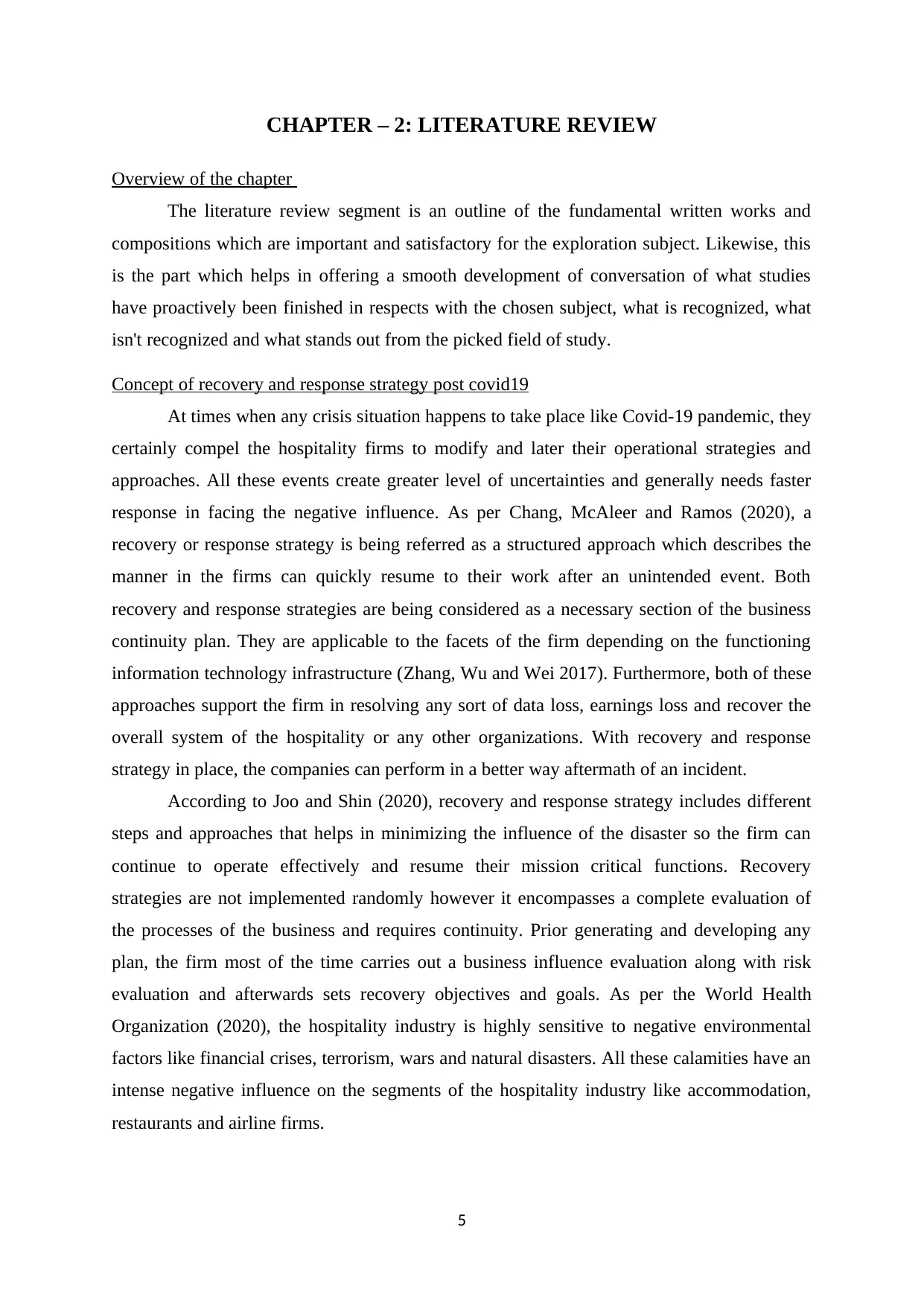
CHAPTER – 2: LITERATURE REVIEW
Overview of the chapter
The literature review segment is an outline of the fundamental written works and
compositions which are important and satisfactory for the exploration subject. Likewise, this
is the part which helps in offering a smooth development of conversation of what studies
have proactively been finished in respects with the chosen subject, what is recognized, what
isn't recognized and what stands out from the picked field of study.
Concept of recovery and response strategy post covid19
At times when any crisis situation happens to take place like Covid-19 pandemic, they
certainly compel the hospitality firms to modify and later their operational strategies and
approaches. All these events create greater level of uncertainties and generally needs faster
response in facing the negative influence. As per Chang, McAleer and Ramos (2020), a
recovery or response strategy is being referred as a structured approach which describes the
manner in the firms can quickly resume to their work after an unintended event. Both
recovery and response strategies are being considered as a necessary section of the business
continuity plan. They are applicable to the facets of the firm depending on the functioning
information technology infrastructure (Zhang, Wu and Wei 2017). Furthermore, both of these
approaches support the firm in resolving any sort of data loss, earnings loss and recover the
overall system of the hospitality or any other organizations. With recovery and response
strategy in place, the companies can perform in a better way aftermath of an incident.
According to Joo and Shin (2020), recovery and response strategy includes different
steps and approaches that helps in minimizing the influence of the disaster so the firm can
continue to operate effectively and resume their mission critical functions. Recovery
strategies are not implemented randomly however it encompasses a complete evaluation of
the processes of the business and requires continuity. Prior generating and developing any
plan, the firm most of the time carries out a business influence evaluation along with risk
evaluation and afterwards sets recovery objectives and goals. As per the World Health
Organization (2020), the hospitality industry is highly sensitive to negative environmental
factors like financial crises, terrorism, wars and natural disasters. All these calamities have an
intense negative influence on the segments of the hospitality industry like accommodation,
restaurants and airline firms.
5
Overview of the chapter
The literature review segment is an outline of the fundamental written works and
compositions which are important and satisfactory for the exploration subject. Likewise, this
is the part which helps in offering a smooth development of conversation of what studies
have proactively been finished in respects with the chosen subject, what is recognized, what
isn't recognized and what stands out from the picked field of study.
Concept of recovery and response strategy post covid19
At times when any crisis situation happens to take place like Covid-19 pandemic, they
certainly compel the hospitality firms to modify and later their operational strategies and
approaches. All these events create greater level of uncertainties and generally needs faster
response in facing the negative influence. As per Chang, McAleer and Ramos (2020), a
recovery or response strategy is being referred as a structured approach which describes the
manner in the firms can quickly resume to their work after an unintended event. Both
recovery and response strategies are being considered as a necessary section of the business
continuity plan. They are applicable to the facets of the firm depending on the functioning
information technology infrastructure (Zhang, Wu and Wei 2017). Furthermore, both of these
approaches support the firm in resolving any sort of data loss, earnings loss and recover the
overall system of the hospitality or any other organizations. With recovery and response
strategy in place, the companies can perform in a better way aftermath of an incident.
According to Joo and Shin (2020), recovery and response strategy includes different
steps and approaches that helps in minimizing the influence of the disaster so the firm can
continue to operate effectively and resume their mission critical functions. Recovery
strategies are not implemented randomly however it encompasses a complete evaluation of
the processes of the business and requires continuity. Prior generating and developing any
plan, the firm most of the time carries out a business influence evaluation along with risk
evaluation and afterwards sets recovery objectives and goals. As per the World Health
Organization (2020), the hospitality industry is highly sensitive to negative environmental
factors like financial crises, terrorism, wars and natural disasters. All these calamities have an
intense negative influence on the segments of the hospitality industry like accommodation,
restaurants and airline firms.
5
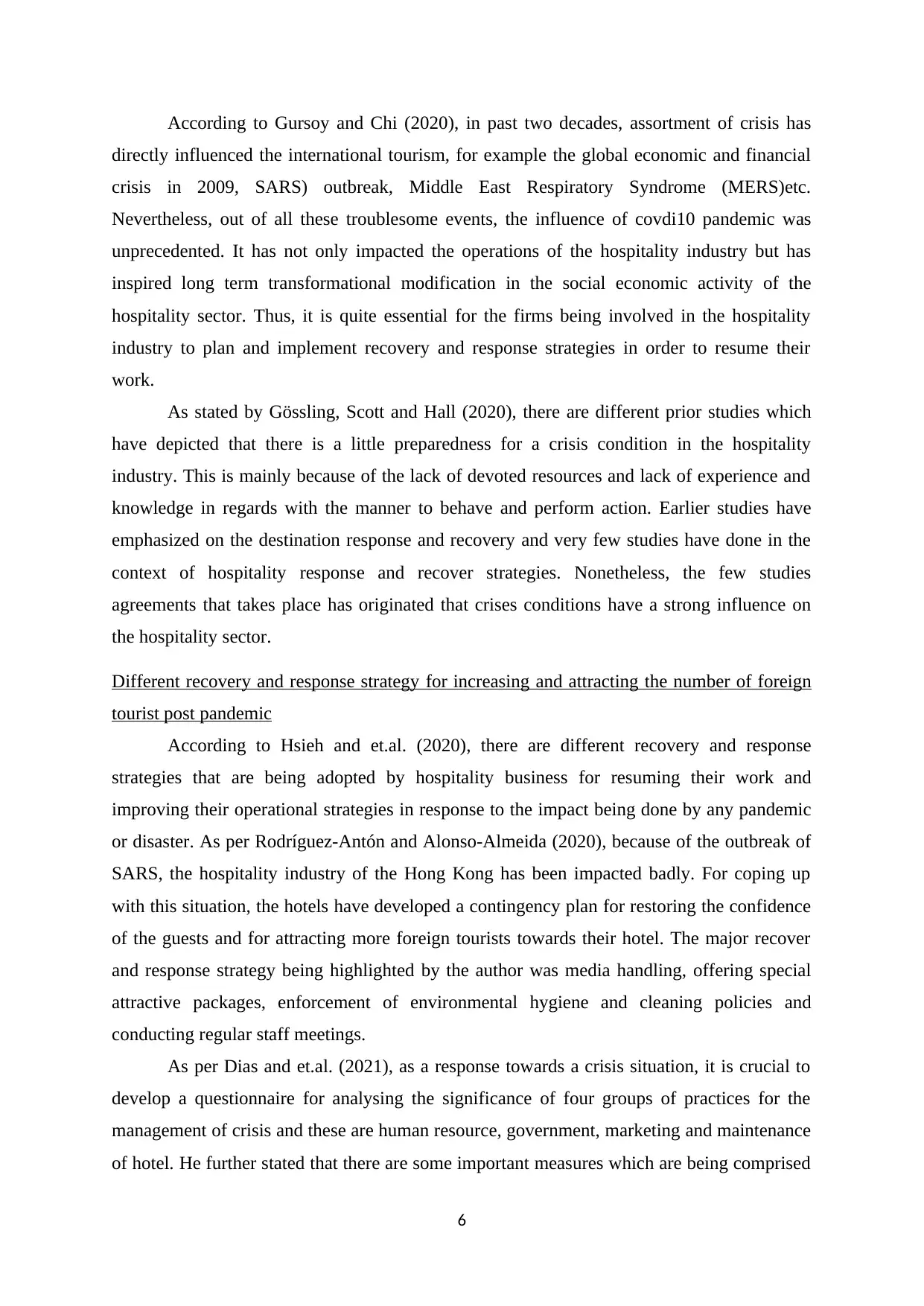
According to Gursoy and Chi (2020), in past two decades, assortment of crisis has
directly influenced the international tourism, for example the global economic and financial
crisis in 2009, SARS) outbreak, Middle East Respiratory Syndrome (MERS)etc.
Nevertheless, out of all these troublesome events, the influence of covdi10 pandemic was
unprecedented. It has not only impacted the operations of the hospitality industry but has
inspired long term transformational modification in the social economic activity of the
hospitality sector. Thus, it is quite essential for the firms being involved in the hospitality
industry to plan and implement recovery and response strategies in order to resume their
work.
As stated by Gössling, Scott and Hall (2020), there are different prior studies which
have depicted that there is a little preparedness for a crisis condition in the hospitality
industry. This is mainly because of the lack of devoted resources and lack of experience and
knowledge in regards with the manner to behave and perform action. Earlier studies have
emphasized on the destination response and recovery and very few studies have done in the
context of hospitality response and recover strategies. Nonetheless, the few studies
agreements that takes place has originated that crises conditions have a strong influence on
the hospitality sector.
Different recovery and response strategy for increasing and attracting the number of foreign
tourist post pandemic
According to Hsieh and et.al. (2020), there are different recovery and response
strategies that are being adopted by hospitality business for resuming their work and
improving their operational strategies in response to the impact being done by any pandemic
or disaster. As per Rodríguez-Antón and Alonso-Almeida (2020), because of the outbreak of
SARS, the hospitality industry of the Hong Kong has been impacted badly. For coping up
with this situation, the hotels have developed a contingency plan for restoring the confidence
of the guests and for attracting more foreign tourists towards their hotel. The major recover
and response strategy being highlighted by the author was media handling, offering special
attractive packages, enforcement of environmental hygiene and cleaning policies and
conducting regular staff meetings.
As per Dias and et.al. (2021), as a response towards a crisis situation, it is crucial to
develop a questionnaire for analysing the significance of four groups of practices for the
management of crisis and these are human resource, government, marketing and maintenance
of hotel. He further stated that there are some important measures which are being comprised
6
directly influenced the international tourism, for example the global economic and financial
crisis in 2009, SARS) outbreak, Middle East Respiratory Syndrome (MERS)etc.
Nevertheless, out of all these troublesome events, the influence of covdi10 pandemic was
unprecedented. It has not only impacted the operations of the hospitality industry but has
inspired long term transformational modification in the social economic activity of the
hospitality sector. Thus, it is quite essential for the firms being involved in the hospitality
industry to plan and implement recovery and response strategies in order to resume their
work.
As stated by Gössling, Scott and Hall (2020), there are different prior studies which
have depicted that there is a little preparedness for a crisis condition in the hospitality
industry. This is mainly because of the lack of devoted resources and lack of experience and
knowledge in regards with the manner to behave and perform action. Earlier studies have
emphasized on the destination response and recovery and very few studies have done in the
context of hospitality response and recover strategies. Nonetheless, the few studies
agreements that takes place has originated that crises conditions have a strong influence on
the hospitality sector.
Different recovery and response strategy for increasing and attracting the number of foreign
tourist post pandemic
According to Hsieh and et.al. (2020), there are different recovery and response
strategies that are being adopted by hospitality business for resuming their work and
improving their operational strategies in response to the impact being done by any pandemic
or disaster. As per Rodríguez-Antón and Alonso-Almeida (2020), because of the outbreak of
SARS, the hospitality industry of the Hong Kong has been impacted badly. For coping up
with this situation, the hotels have developed a contingency plan for restoring the confidence
of the guests and for attracting more foreign tourists towards their hotel. The major recover
and response strategy being highlighted by the author was media handling, offering special
attractive packages, enforcement of environmental hygiene and cleaning policies and
conducting regular staff meetings.
As per Dias and et.al. (2021), as a response towards a crisis situation, it is crucial to
develop a questionnaire for analysing the significance of four groups of practices for the
management of crisis and these are human resource, government, marketing and maintenance
of hotel. He further stated that there are some important measures which are being comprised
6
⊘ This is a preview!⊘
Do you want full access?
Subscribe today to unlock all pages.

Trusted by 1+ million students worldwide
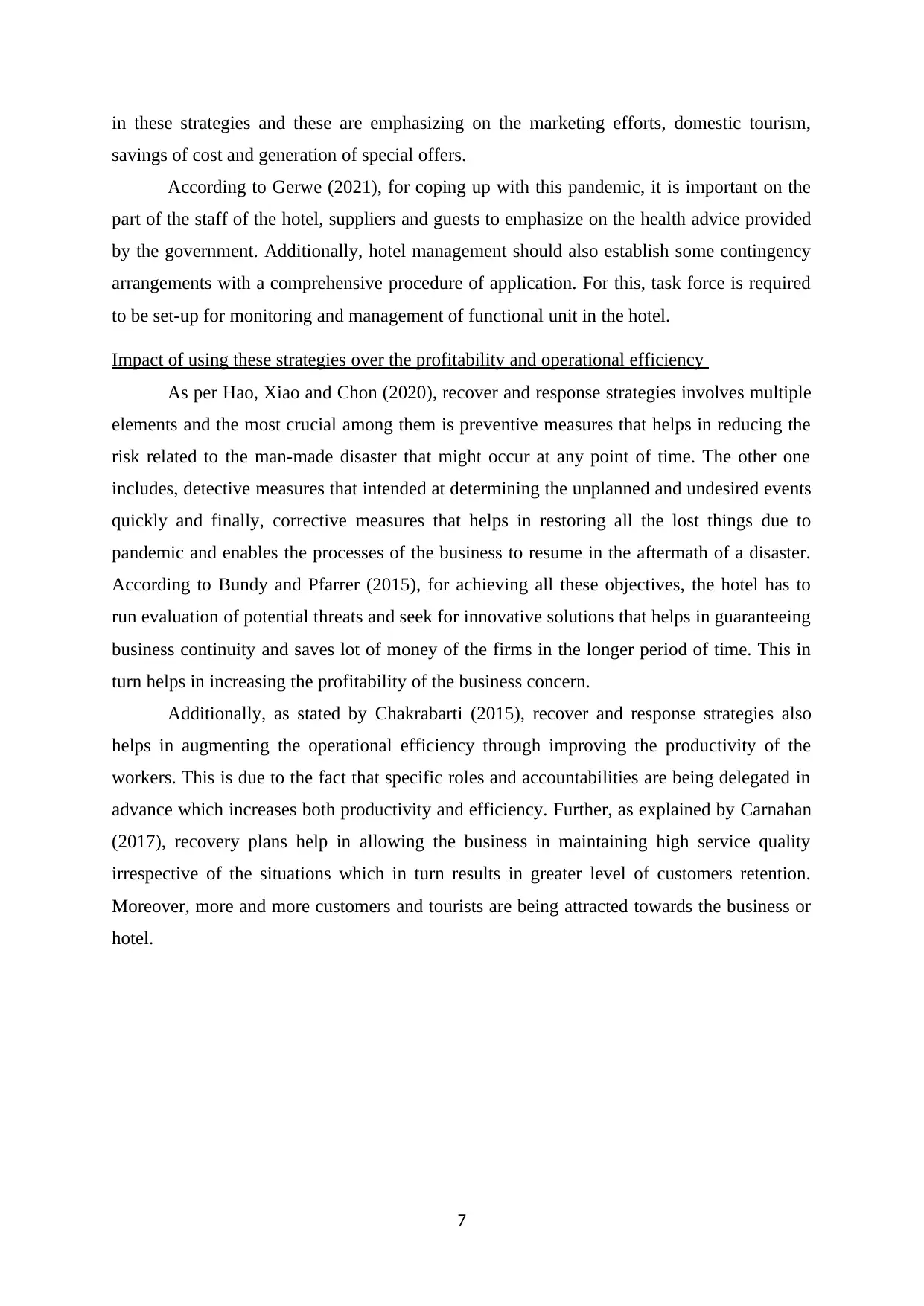
in these strategies and these are emphasizing on the marketing efforts, domestic tourism,
savings of cost and generation of special offers.
According to Gerwe (2021), for coping up with this pandemic, it is important on the
part of the staff of the hotel, suppliers and guests to emphasize on the health advice provided
by the government. Additionally, hotel management should also establish some contingency
arrangements with a comprehensive procedure of application. For this, task force is required
to be set-up for monitoring and management of functional unit in the hotel.
Impact of using these strategies over the profitability and operational efficiency
As per Hao, Xiao and Chon (2020), recover and response strategies involves multiple
elements and the most crucial among them is preventive measures that helps in reducing the
risk related to the man-made disaster that might occur at any point of time. The other one
includes, detective measures that intended at determining the unplanned and undesired events
quickly and finally, corrective measures that helps in restoring all the lost things due to
pandemic and enables the processes of the business to resume in the aftermath of a disaster.
According to Bundy and Pfarrer (2015), for achieving all these objectives, the hotel has to
run evaluation of potential threats and seek for innovative solutions that helps in guaranteeing
business continuity and saves lot of money of the firms in the longer period of time. This in
turn helps in increasing the profitability of the business concern.
Additionally, as stated by Chakrabarti (2015), recover and response strategies also
helps in augmenting the operational efficiency through improving the productivity of the
workers. This is due to the fact that specific roles and accountabilities are being delegated in
advance which increases both productivity and efficiency. Further, as explained by Carnahan
(2017), recovery plans help in allowing the business in maintaining high service quality
irrespective of the situations which in turn results in greater level of customers retention.
Moreover, more and more customers and tourists are being attracted towards the business or
hotel.
7
savings of cost and generation of special offers.
According to Gerwe (2021), for coping up with this pandemic, it is important on the
part of the staff of the hotel, suppliers and guests to emphasize on the health advice provided
by the government. Additionally, hotel management should also establish some contingency
arrangements with a comprehensive procedure of application. For this, task force is required
to be set-up for monitoring and management of functional unit in the hotel.
Impact of using these strategies over the profitability and operational efficiency
As per Hao, Xiao and Chon (2020), recover and response strategies involves multiple
elements and the most crucial among them is preventive measures that helps in reducing the
risk related to the man-made disaster that might occur at any point of time. The other one
includes, detective measures that intended at determining the unplanned and undesired events
quickly and finally, corrective measures that helps in restoring all the lost things due to
pandemic and enables the processes of the business to resume in the aftermath of a disaster.
According to Bundy and Pfarrer (2015), for achieving all these objectives, the hotel has to
run evaluation of potential threats and seek for innovative solutions that helps in guaranteeing
business continuity and saves lot of money of the firms in the longer period of time. This in
turn helps in increasing the profitability of the business concern.
Additionally, as stated by Chakrabarti (2015), recover and response strategies also
helps in augmenting the operational efficiency through improving the productivity of the
workers. This is due to the fact that specific roles and accountabilities are being delegated in
advance which increases both productivity and efficiency. Further, as explained by Carnahan
(2017), recovery plans help in allowing the business in maintaining high service quality
irrespective of the situations which in turn results in greater level of customers retention.
Moreover, more and more customers and tourists are being attracted towards the business or
hotel.
7
Paraphrase This Document
Need a fresh take? Get an instant paraphrase of this document with our AI Paraphraser
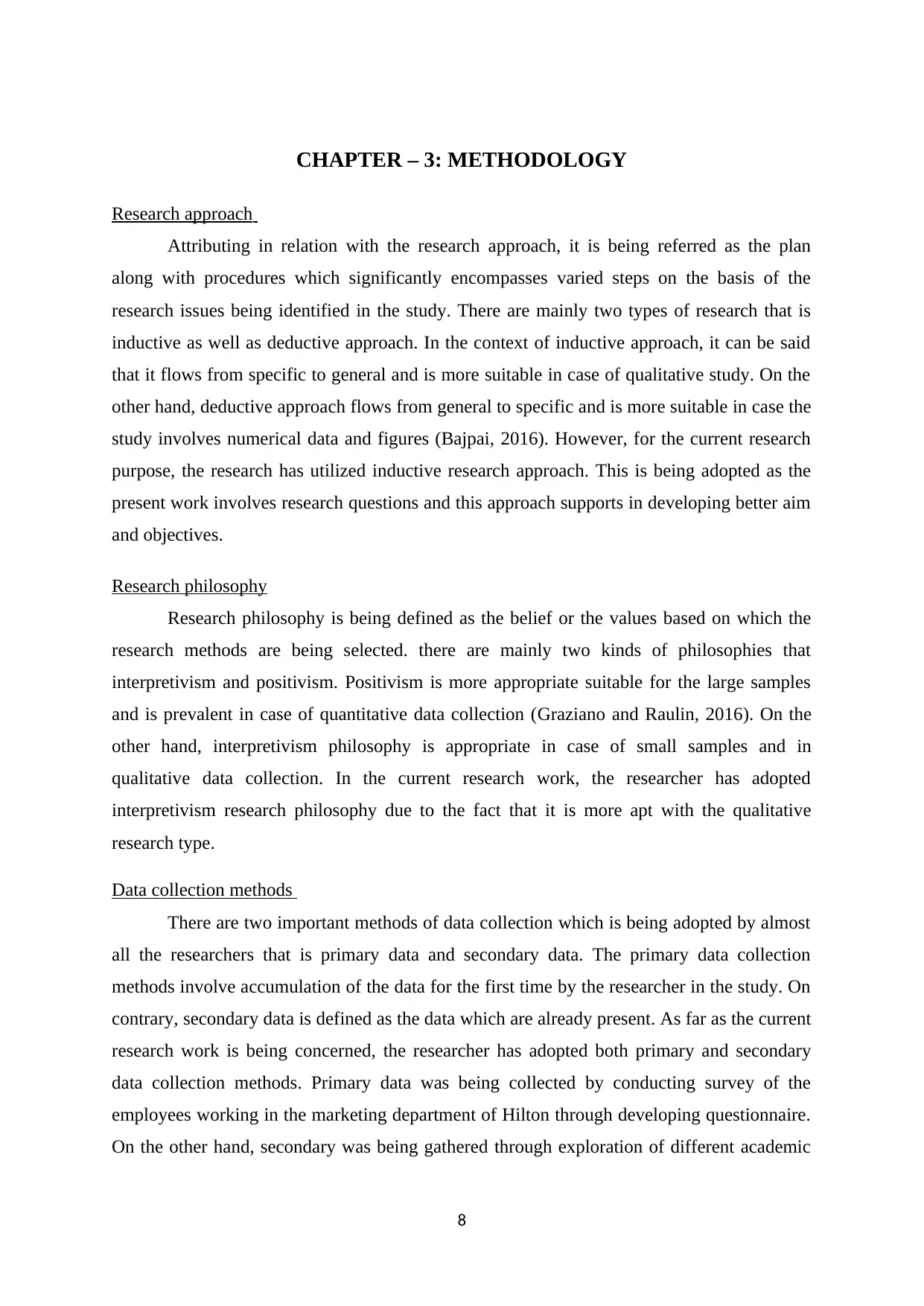
CHAPTER – 3: METHODOLOGY
Research approach
Attributing in relation with the research approach, it is being referred as the plan
along with procedures which significantly encompasses varied steps on the basis of the
research issues being identified in the study. There are mainly two types of research that is
inductive as well as deductive approach. In the context of inductive approach, it can be said
that it flows from specific to general and is more suitable in case of qualitative study. On the
other hand, deductive approach flows from general to specific and is more suitable in case the
study involves numerical data and figures (Bajpai, 2016). However, for the current research
purpose, the research has utilized inductive research approach. This is being adopted as the
present work involves research questions and this approach supports in developing better aim
and objectives.
Research philosophy
Research philosophy is being defined as the belief or the values based on which the
research methods are being selected. there are mainly two kinds of philosophies that
interpretivism and positivism. Positivism is more appropriate suitable for the large samples
and is prevalent in case of quantitative data collection (Graziano and Raulin, 2016). On the
other hand, interpretivism philosophy is appropriate in case of small samples and in
qualitative data collection. In the current research work, the researcher has adopted
interpretivism research philosophy due to the fact that it is more apt with the qualitative
research type.
Data collection methods
There are two important methods of data collection which is being adopted by almost
all the researchers that is primary data and secondary data. The primary data collection
methods involve accumulation of the data for the first time by the researcher in the study. On
contrary, secondary data is defined as the data which are already present. As far as the current
research work is being concerned, the researcher has adopted both primary and secondary
data collection methods. Primary data was being collected by conducting survey of the
employees working in the marketing department of Hilton through developing questionnaire.
On the other hand, secondary was being gathered through exploration of different academic
8
Research approach
Attributing in relation with the research approach, it is being referred as the plan
along with procedures which significantly encompasses varied steps on the basis of the
research issues being identified in the study. There are mainly two types of research that is
inductive as well as deductive approach. In the context of inductive approach, it can be said
that it flows from specific to general and is more suitable in case of qualitative study. On the
other hand, deductive approach flows from general to specific and is more suitable in case the
study involves numerical data and figures (Bajpai, 2016). However, for the current research
purpose, the research has utilized inductive research approach. This is being adopted as the
present work involves research questions and this approach supports in developing better aim
and objectives.
Research philosophy
Research philosophy is being defined as the belief or the values based on which the
research methods are being selected. there are mainly two kinds of philosophies that
interpretivism and positivism. Positivism is more appropriate suitable for the large samples
and is prevalent in case of quantitative data collection (Graziano and Raulin, 2016). On the
other hand, interpretivism philosophy is appropriate in case of small samples and in
qualitative data collection. In the current research work, the researcher has adopted
interpretivism research philosophy due to the fact that it is more apt with the qualitative
research type.
Data collection methods
There are two important methods of data collection which is being adopted by almost
all the researchers that is primary data and secondary data. The primary data collection
methods involve accumulation of the data for the first time by the researcher in the study. On
contrary, secondary data is defined as the data which are already present. As far as the current
research work is being concerned, the researcher has adopted both primary and secondary
data collection methods. Primary data was being collected by conducting survey of the
employees working in the marketing department of Hilton through developing questionnaire.
On the other hand, secondary was being gathered through exploration of different academic
8
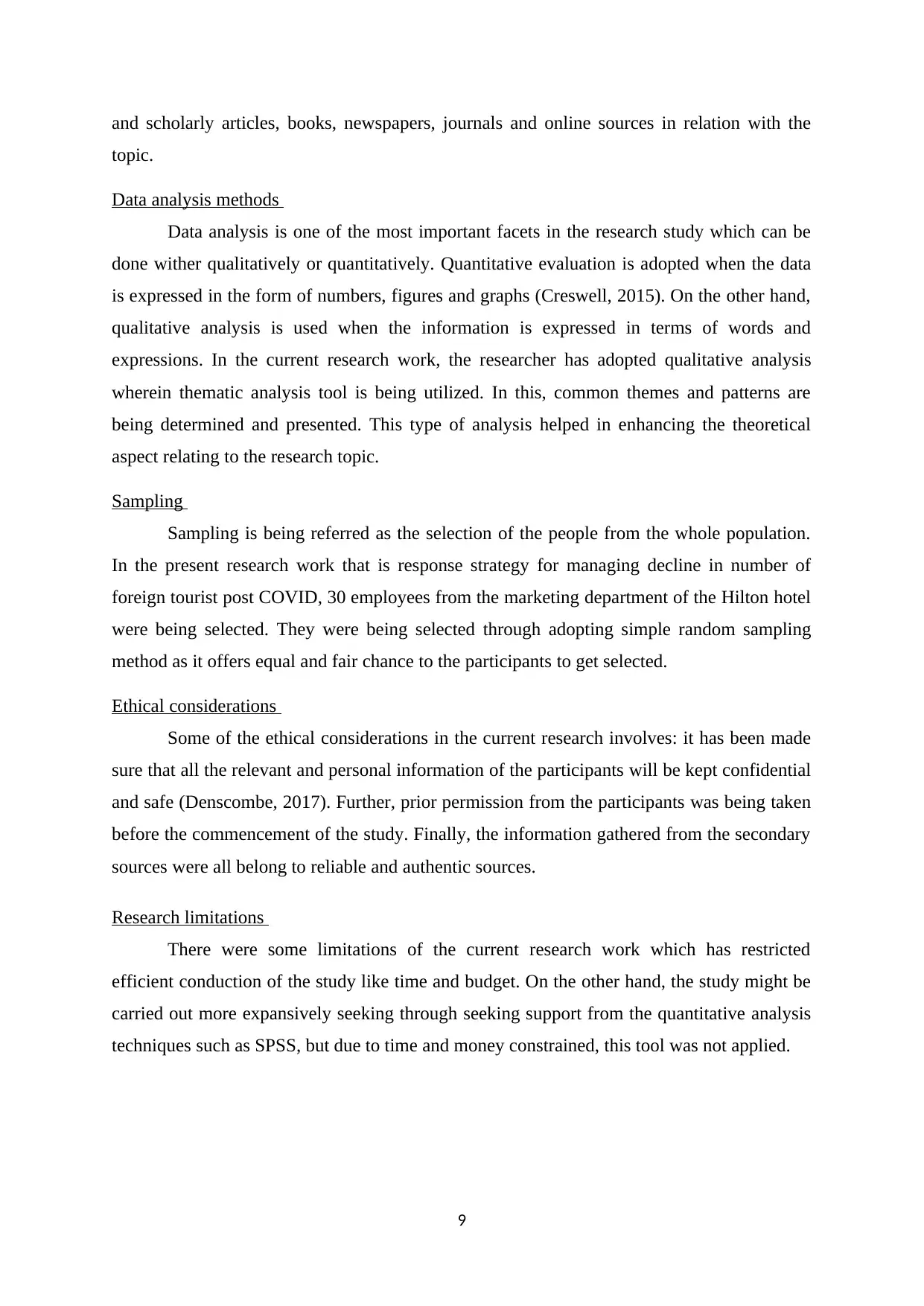
and scholarly articles, books, newspapers, journals and online sources in relation with the
topic.
Data analysis methods
Data analysis is one of the most important facets in the research study which can be
done wither qualitatively or quantitatively. Quantitative evaluation is adopted when the data
is expressed in the form of numbers, figures and graphs (Creswell, 2015). On the other hand,
qualitative analysis is used when the information is expressed in terms of words and
expressions. In the current research work, the researcher has adopted qualitative analysis
wherein thematic analysis tool is being utilized. In this, common themes and patterns are
being determined and presented. This type of analysis helped in enhancing the theoretical
aspect relating to the research topic.
Sampling
Sampling is being referred as the selection of the people from the whole population.
In the present research work that is response strategy for managing decline in number of
foreign tourist post COVID, 30 employees from the marketing department of the Hilton hotel
were being selected. They were being selected through adopting simple random sampling
method as it offers equal and fair chance to the participants to get selected.
Ethical considerations
Some of the ethical considerations in the current research involves: it has been made
sure that all the relevant and personal information of the participants will be kept confidential
and safe (Denscombe, 2017). Further, prior permission from the participants was being taken
before the commencement of the study. Finally, the information gathered from the secondary
sources were all belong to reliable and authentic sources.
Research limitations
There were some limitations of the current research work which has restricted
efficient conduction of the study like time and budget. On the other hand, the study might be
carried out more expansively seeking through seeking support from the quantitative analysis
techniques such as SPSS, but due to time and money constrained, this tool was not applied.
9
topic.
Data analysis methods
Data analysis is one of the most important facets in the research study which can be
done wither qualitatively or quantitatively. Quantitative evaluation is adopted when the data
is expressed in the form of numbers, figures and graphs (Creswell, 2015). On the other hand,
qualitative analysis is used when the information is expressed in terms of words and
expressions. In the current research work, the researcher has adopted qualitative analysis
wherein thematic analysis tool is being utilized. In this, common themes and patterns are
being determined and presented. This type of analysis helped in enhancing the theoretical
aspect relating to the research topic.
Sampling
Sampling is being referred as the selection of the people from the whole population.
In the present research work that is response strategy for managing decline in number of
foreign tourist post COVID, 30 employees from the marketing department of the Hilton hotel
were being selected. They were being selected through adopting simple random sampling
method as it offers equal and fair chance to the participants to get selected.
Ethical considerations
Some of the ethical considerations in the current research involves: it has been made
sure that all the relevant and personal information of the participants will be kept confidential
and safe (Denscombe, 2017). Further, prior permission from the participants was being taken
before the commencement of the study. Finally, the information gathered from the secondary
sources were all belong to reliable and authentic sources.
Research limitations
There were some limitations of the current research work which has restricted
efficient conduction of the study like time and budget. On the other hand, the study might be
carried out more expansively seeking through seeking support from the quantitative analysis
techniques such as SPSS, but due to time and money constrained, this tool was not applied.
9
⊘ This is a preview!⊘
Do you want full access?
Subscribe today to unlock all pages.

Trusted by 1+ million students worldwide
1 out of 25
Related Documents
Your All-in-One AI-Powered Toolkit for Academic Success.
+13062052269
info@desklib.com
Available 24*7 on WhatsApp / Email
![[object Object]](/_next/static/media/star-bottom.7253800d.svg)
Unlock your academic potential
Copyright © 2020–2026 A2Z Services. All Rights Reserved. Developed and managed by ZUCOL.





